Displaying items by tag: Route des Princes
Foxall Rues Second Place Finish in La Route Des Princes
After 2450 miles of offshore racing, linking Valencia to Roscoff on the Bay of Morlaix via Lisbon, Dún Laoghaire and Plymouth and 16 inshore short course contests of which they won nine, Edmond de Rothschild are winners of the MOD70 class on the inaugural Route des Princes multihull race around Europe.
Finishing 11 minutes and 50 seconds behind them in second place was Oman Air-Musandam with Irish sailor Damian Foxall onboard. And taking third place across the finish line was Virbac-Paprec 70 (Jean-Pierre Dick) which completed the fourth stage of the Route des Princes at 14:51:23 UTC, just 15 minutes and 9 seconds behind the first MOD70 Edmond de Rothschild.
Starting on Saturday evening at 2000hrs in Plymouth Edmond de Rothschild had a 4pts lead after winning the final inshore series, that meant Oman Air-Musandam – ideally – needed to win the bonus and win the leg. They lead Edmond de Rothschild but were never able to extend and as they ran across the channel from Wolf Rock to the Roche Gautier mark, Josse's crew got to the east and were able to extend slightly.
And so as the MOD70's docked in the new Bloscon Marina in Roscoff the satisfaction was obvious on the face of skipper Josse, whilst Gavignet – correspondingly could not conceal his disappointment. The loss of small points here and there since the 9th June start, was Oman Air-Musandam's downfall, not least being taxed four points in the protest room in Dun Laoghaire from a relatively innocuous Lisbon start line incident with Spindrift. Josse's final satisfaction – leading a team stacked with offshore talent and less multihull experience– was to cap their overall victory with an offshore triumph.
Commenting after the finish Irish offshore sailor Damian Foxall stated 'we have to take the positives from the Route des Princes, the offshore wins in to Lisbon and Plymouth and the points rounding the Fastnet rock on the way to Dun Laoghaire. Looking forward to being there again in mid August for the biennial Fastnet Race.
#rdp13 – Sebastien Josse's MOD70 Groupe Edmond De Rothschild took an early lead this morning in Dublin Bay shortly after the start of the third offshore leg to Plymouth in the Routes Des Princes.
Racing under full mainsail and gennaker downwind, the crews enjoyed winds of 11-16kts from the SW system for the preliminary set of 7.2 miles with the start and turn windward close to the town's East Pier.
Sunshine and a moderate breeze NW'ly have replaced the strong, gusty winds of the weekend. With the first bonus points available at Bardsey Island, off the Welsh coast, it will be full on from the start line and the leaders should round the little island between 1700 and 1800hrs this evening.
On cue, at 1100hrs, the Routes des Princes Multi50s, fleet of MOD70's and the 80 Maxi left the Dun Laoghaire start line bound for Plymouth.
This looks to be a complicated leg with many transition zones where the leaders are likely to stop and be caught by the chasing pack.
Winds are expected to drop away Effective Fastnet for the MOD70's while the race for the Multi50s has been shortened. Fastnet is no longer a mark of the race for the smaller Multis.
The race for the MOD70's Eddystone will still be told to the crews before they reach Bishop Rock.
Shortly after departure today Sidney Gavignet, skipper of Oman Air Musandam sent this email from onboard:
'Here we go again. Bye bye Ireland and thank you for your warm welcome. A thought for Spindrift which will remain at the dock. The story of the Route des Princes has been eventful and I'm sure there are still things to happen. On board we have Ahmed who is only 20 years old who has been only sailing small 18 foot catamarans for a couple of years. Just now we are in visual contact with Virbac-Paprec and Gitana in less than 10 knots of wind. Behind us Prince de Bretagne has blown their gennaker. It is going to be a long race for them.....'
Meanwhile Spindrift remains at the dock in Dun Laoghaire as plans are made to transport the 70' vessel to France. Spindrift crew Jacques Guichard is comfortable and will remain in hospital in Dublin for further medical attention.
Foxall & Mod 70s Sail Away, Beaten Again By Irish Winds
#rdp13 – There is further disappointment this morning as the much hoped for challenge to the Round Ireland speed sailing record has been scrapped. Last night, Route des Princes organisers admitted the weather window to beat the long standing 44-hour Round Ireland record had been missed.
Organisers confirmed an attempt in May. Last week, Afloat.ie had signalled the weekend opportunity for a Round Ireland attempt since last Wednesday.
Forecasts for today (Monday) show only light winds which means even these ultra fast boats could not make a record time.
Instead, the fleet will sail a newly configured course to Plymouth with a measure of flexibility built. in The extreme easterly turning mark may be as far up the Channel as Southern Head off Newhaven, East Sussex. There are three other choices at Nab Tower, Fairway and Shambles. The longest possible course is 850 miles and the shortest is 650.
It is the second time this year that Ireland's Damian Foxall and the team of Omansail have ditched plans for an attempt on the Round Ireland speed sailing record. Foxall and the crew came to Ireland in March for a dedicated attempt but were beaten back by gales on the Welsh coast. For now, the 20–year record set by the late adventurer Steve Fossett on the Lakota Catamaran lives on. Perhaps Foxall and Omansail might make it third time lucky sometime soon?
With no inshore racing possible in Dun Laoghaire on Sunday for the Routes des Princes fleet due to very high winds on Dublin Bay, the focus for the multihull fleet returns to offshore racing as Leg 3, to Plymouth is set to start on Monday morning at 1100hrs local time (Dublin) but there will be no Round Ireland challenge.
The fleet has been left with no inshore racing in Dun Laoghaire, and it also lost the opportunity of a weather window for a record challenge highlighted by Afloat.ie since last Wednesday.
After the spectacular capsize of Yann Guichard's Spindrift on Saturday there will now be three MOD70's racing on the penultimate offshore stage.
The race leading MOD70 was righted by crane on Saturday evening and the crew and technical team spent Sunday doing their best to restore what equipment had been salvaged and make the hull ready for repatriation back to France which is expected to take place later this week.
Injured crewman Jacques Guichard (FRA), who suffered a fractured pelvis, remains comfortable in hospital and will be further evaluated by a specialist on Monday. He is good form and earlier today he called his crewmates for an update.
From the extremes of too much wind which prevented inshore racing on Dublin Bay – Sunday's gusts peaked at over 40kts – breezes are forecast to be insufficient for a meaningful attempt on the Round Ireland record which it was hoped might be an integral part of the Leg 3 course.
Instead the course to Plymouth has a measure of flexibility built. The extreme easterly turning mark may be as far up the Channel as Southern Head off Newhaven, East Sussex. There are three other choices at Nab Tower, Fairway and Shambles. The longest possible course is 850 miles and the shortest is 650. And racing in the English Channel – downwind with strong tides – will surely mean some of the most tactical racing yet. (map of course attached)
Leg 3 starts at 1100hrs local time Monday. After a short windward-leeward loop off Dun Laoghaire at the start the course goes to Bardsey Island off the Anglesey coast, which is expected to be a 60 miles downwind leg in NW'ly winds starting off at a moderate 10-15kts and building later to 25kts. Bardsey is the first of two bonus point scoring opportunities for the first boat in each class. From this turn it is 195 miles to Fastnet Rock. As current forecasts stand this is likely to be upwind or a tight reach. Then from Fastnet the fleet will have 150 miles of downwind sailing to pass Bishop Rock and Hands Deep at the Scilly Isles. Bishop Rock is the second points scoring opportunity. Before passing Eddystone Rocks off Plymouth Race Direction will inform contestants what the remaining marks of the course will be. Fastnet and Bishops Rock, and beyond, the westerly breezes are expected to slacken off, mostly thereafter racing downwind in 10-12kts and less at times. Race Direction anticipate the leaders reaching Plymouth early on Wednesday afternoon.
Points are still close among the leading contenders in the MOD70 fleet. Just four points separates Sébastien Josse's Edmond de Rothshchild from Sidney Gavignet's Oman Air-Musandam with Irish sailor Damian Foxall onboard.
#RDP13 – In a further set back for the Route Des Princes stop over in Dun Laoghaire, too much wind on Dublin Bay today has led to the cancellation of the second and final day of inshore racing off Dun Laoghaire's East pier. The decision was posted by organisers at 11am today.
Yesterday, the first of six scheduled races was abandoned only minutes after the start when one of nine competing trimarans, leg three winner Spindrift, capsized.
Other sailing in the bay for the DBSC SB20 class has also been scrubbed as westerly winds reach 30 knots. Across the Bay in Howth, Squib east coast racing has also been abandoned.
Spindrift Trimaran Capsize Captured on Video Here!
#rdp13 – Video of yesterday's dramatic capsize in Dun Laoghaire depicts the trimaran fleet start of the first inshore race in the Route Des Princes regatta on Dublin Bay. The video posted on youtube shows the build up to the Spindrift capsize that led to a major emergency operation and the airlift of one crew man with a broken pelvis.
"I was unable to do anything at the helm, the boat was turned over with a single blow. We let out the staysail immediately, but it was too late as it all happened in a split second, Skipper Yann Guichard said.
As reported yesterday by Afloat.ie, the trimaran has been recovered to Dun Laoghaire but the 70-footer's mast was broken in the capsize.
The mast, rigging and sails that were disconnected from the hull by divers prior to towing by lifeboat remain at sea pending salvage today
Spindrift Statement on Dun Laoghaire Route de Prince Capsize
#rdp13 – The MOD70 Spindrift capsized on the first leg of the Route des Princes inshore races in Dun Laoghaire today as Afloat.ie reported earlier.
All crew are safe and sound, but Jacques Guichard, Yann's brother and a key member of the crew, was hurt in the accident. Both brothers were airlifted by helicopter to the hospital in Dublin, where Jacques was diagnosed with fractures to the pelvis.
Yann Guichard, the skipper of Spindrift explained the circumstances of the capsize: "We had 22 to 24 knots of wind on the start line with gusts of up to 30 knots at the lower end of the course. We were at the limit of weather conditions for our boats and it was not great for racing. All the MODs had one reef in the main and staysail. We started a bit below and behind the fleet and found ourselves slightly in a wind shadow. When our rivals had moved away we had a sudden gust literally flattened us.
"I was unable to do anything at the helm, the boat was turned over with a single blow. We let out the staysail immediately, but it was too late as it all happened in a split second. the boat was lifted onto the port float and went over. Jacques was with me in the cockpit and we found ourselves in the net ... we managed to get out and then were airlifted. The mast broke in two when Spindrift turned over. The frame of the trimaran was towed away to the port. "
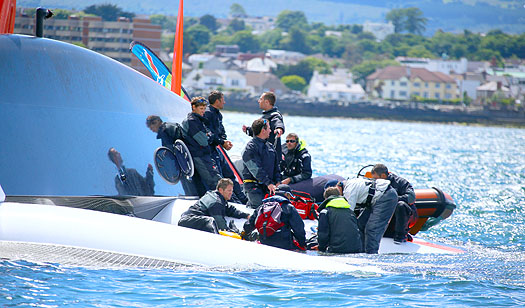
Jacques Guichard receives medical treatment prior to airlift (above) on the upturned Spindrift hull in Dublin Bay. Photo: Afloat.ie
All the crew, with the help of the whole Spindrift racing team, immediately mobilised to secure the frame and make sure the towing operation went safely. The trimaran will be returned to base in port and the Spindrift racing team will quickly and expertly assess the damage. The team will then seek a solution from the boat's home base in Saint Philibert.
#Spindrift - The race-winning multihull Spindrift has capsized in gale force winds off Dun Laoghaire this afternoon (22 June) at the start of the Route des Princes series of inshore racing spectacle on Dublin Bay, as David O'Brien reports on scene.
The MOD70 trimaran that was first into Dun Laoghaire from Lisbon on Wednesday capsized meres from spectators in Scotsman's Bay ahead of the first of three inshore races.
Rescue photos below.
The accident happened about 700 metres off the starting line in the first race, as the boats were accelerating in the strong and gusty winds. The boats were not carrying full sail as a precaution against the strong offshore winds blowing in the bay. Today's in–port racing was billed as 'fast and furious'.
At least one person is injured and is being treated upturned hull of the stricken craft. As of 3.08pm a rescue helicopter was dropping its winchman to the vessel.
It is feared by National Yacht Club personnel that the mast of the inverted trimaran is stuck in the sea bed and may be broken.
All racing has now been postponed as rescue services attended the scene. Eight crew were onboard the vessel at the time of the capsize.
Update 3.10pm: All other boats have returned to Dun Laoghaire Harbour as rescue services continue to attend to the capsized Spindrift and its crew.
Update 3.18pm: Weather conditions in Dun Laoghaire continue to be strong and gusty, and it's reported that some local DBSC RC racing had already been cancelled earlier today.
Update 3.27pm: A news update on the Route des Princes website (via @sailracewin) says one crewman on the upturned Spindrift has a back pain.
Update 3.35pm: Twitter users Mark Lloyd (@Lloyd_Images) and Philip Bromwell (@philipbromwell) have posted photos of the failed Spindrift in Dublin Bay as emergency services attend to the scene.
Update 3.39pm: The crewman casualty has been winched to the helicopter and is being airlifted to Tallaght Hospital. His condition remains unclear.
Update 3.41pm: Triage for any injured racers has been set up at the National Yacht Club and all rescue boats have been asked to report to the NYC to account for numbers.
Update 3.53pm: Assessments are currently being made as to how to recover the 70ft hull still floating north of Dalkey Island.
Update 4.04pm: Sailing journalist Kate Laven comments on Twitter re the Spindrift capsize: "Everyone recovered but two injured"
Update 4.08pm: The Route des Princes website has followed up its earlier update with a news post which confirms that weather conditions at the time of the Spindrift capsize were 20 knots with strong gusts.
Update 4.55pm: Dun Laoghaire lifeboat towing the upturned Spindrift hull (minus mast) towards Dun Laoghaire harbour
Update 6,00pm: The upturned hull has been successfully righted, the hull is intact but the mast is broken.
Update 7.00pm: There are unconfirmed reports that the injury to the Spindrift crew man is a broken pelvis.
Update 8.00pm: Spindrift racing team release statement on capsize and injury to crew member
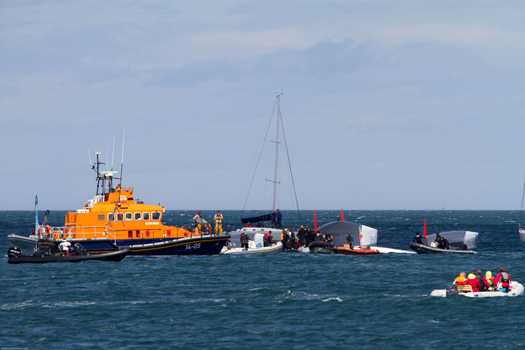
Rescue craft, local boats and the Dun Laoghaire lifeboat attend the upturned hull. Photo: Gareth Craig
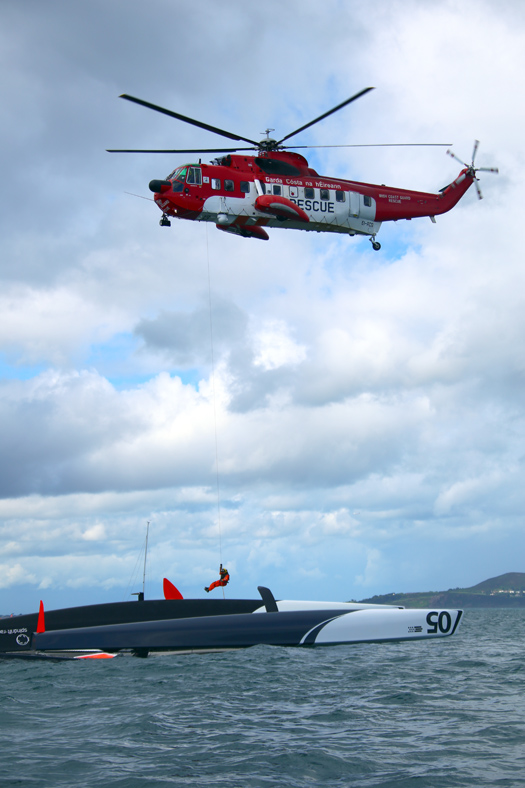
The Coastguard helicopter arrives on scene and a winch man is lowered to make an assessment. Photo: Afloat.ie
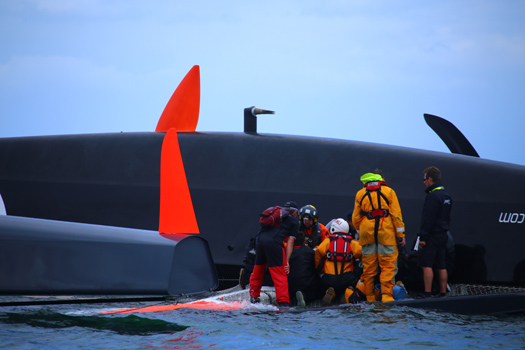
Rescue personnel and Sprindrift crew on the upturned hull in Dublin Bay this afternoon. Photo: Afloat.ie
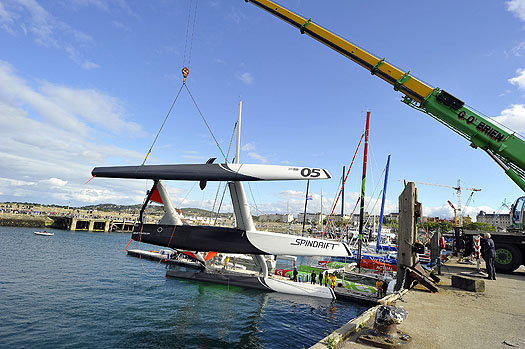
Spindrift minus her mast is lifted in Dun Laoghaire harbour this evening. Photo: Michael Chester
#rdp13 – Passing up this morning's promising weather window for a Round Ireland speed record attempt, the Routes des Princes grand prix multihull fleet will compete as scheduled in Dun Laoghaire this afternoon in what will be a series of heavy weather inshore races.
South–westerly winds are gusting to 25 knots on Dublin Bay one hour before start-time.
Nine multihulls will be racing with six key races planned over Saturday and Sunday for the four strong MOD70 fleet. Valuable race points tallying towards the overall scores for this new multihull race around Europe from Valencia, Spain to Morlaix, France are up for grabs for the MOD70 class.
Three races will be contested from 2pm this afternoon with a further three tomorrow (Sunday) when the winds are due to be even stronger. Courses are set as close to the land as possible to allow spectators a grandstand view of the action.
Visitors to the free La Route des Princes Festival on the East Pier will have the perfect vantage point with live commentary from Irish Olympic sailor Ger Owens and Fiona Bolger.
The substantial shoreside festival opened this morning, and there is a range of different exhibitions and stalls.
The food festival "With Taste" is organised for the general public with small tasting tents offered by restaurateurs and food producers.
Racing should finish around 1600hrs. During the afternoon and evening there is live music in the bandstand until 2130hrs.
At 1830hrs the public prize giving for Leg 2, the stage from Lisbon which finished on Wednesday morning, will be held on the pier and thereafter at 1900hrs Saturday, an autograph session skippers to the public followed by live music.
There are family entertainments for all ages right through the weekend with more live racing and music on Sunday. The Routes des Princes will leave Dun Laoghaire on Monday 24 for an 11am start at the Kish Lighthouse. Depending on weather conditions the fleet will attempt to break the round Ireland speed record.
Last Call for Round Ireland Record Attempt?
#rdp13 – The low pressure area which currently dominates Ireland's weather has speeded up slightly in its eastward movement, and any of the big multihulls in Dun Laoghaire which wish to avail of this useful weather window for a round Ireland record challenge would have to think in terms of leaving the harbour at dawn tomorrow (Saturday) writes W M Nixon.
The situation is fairly clearcut. A successful attempt will require the boat to be at Malin Head at much the same time as the centre of the low is due north of Malin Head. Ideally perhaps, the challenger would aim to be at Malin slightly in advance of the low being due north, in order to avail of the last of the southwesters to make some westing into the open Atlantic before the wind veers rapidly.
On the latest forecasts, the centre of the low will be north of Malin Head between noon and 1300hrs Saturday. From now until then, winds over the entire coastline of 170 miles between Dublin Bay and Malin Head will be fresh occasionally strong southwesterly. In conditions like that, with relatively smooth water, a MOD 70 would expect to average 25 knots, giving a sailing time of around seven hours, indicating a departure from the Kish no later than 0500 hrs.
The wind tomorrow afternoon is then expected to quickly become a near gale from the northwest off Ireland's northwest coasts. Too much wind is as much a hindrance for record times as too little. But there's a chance that any boat on line for a successful record challenge will have covered a substantial distance down the Atlantic seaboard before the swell has increased sufficiently to hamper progress.

































































